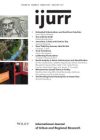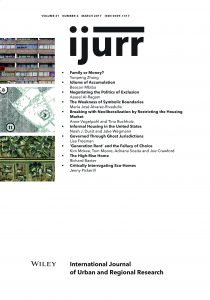This article examines the legal geography of municipal bylaws regulating rooming houses in the City of Toronto. Using a legal geography analysis of Toronto’s rooming house licensing bylaw, I argue that this bylaw is a ghost jurisdiction that designates part of the city as illegal and has implications for governance of the inner suburbs. In so doing, I push the debate on legal geography forward by suggesting that we, as urban scholars, take the temporal seriously in our analysis of space. Drawing from semi-structured interviews, archival data and participant observation, I analyse seemingly mundane legal mechanisms through the case study of suburban rooming houses. Overall, in this article I make three contributions. First, I demonstrate how a temporal analysis is important to legal geography inquiries of uneven regulation and spaces of poverty. Second, I suggest that studies of legal governance are integral for redefining suburban governance amidst socio-economic decline in the inner suburbs. Third, I argue that studying urban legal mechanisms in the suburbs is essential for moving beyond downtown analytical frameworks and is needed to address how low-income suburban tenants, a large majority of whom are racialized newcomers, are unevenly regulated and unfairly governed by local government.

